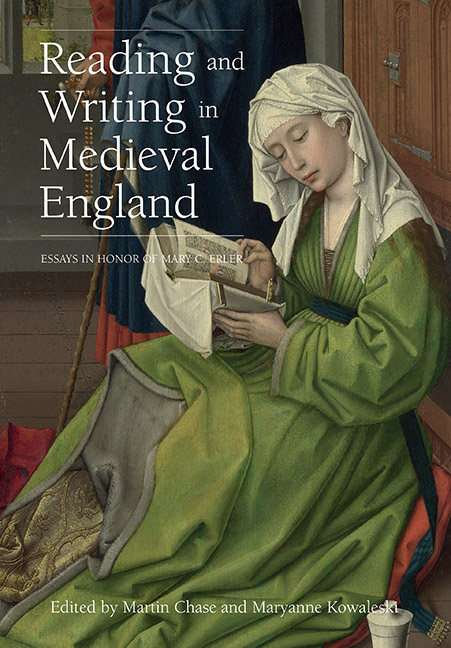Book contents
- Frontmatter
- Contents
- List of Illustrations
- List of Contributors
- List of Abbreviations
- Introduction: Bibliography in the Service of Biography
- “Withinne a Paved Parlour”: Criseyde and Domestic Reading in a City under Siege
- Beatrice Melreth: A London Gentlewoman and her Books
- How Intellectual Were Fifteenth-Century Londoners? Grammar versus Logic in the Citizens’ Encounters with Learned Men
- Social Memory, Literacy, and Piety in Fifteenth-Century Proofs of Age
- Crafting the Old Testament in the Queen Mary Psalter
- Affective Reading and Walter Hilton's Scale of Perfection at Syon
- Book Accessories, Gender, and the Staging of Reading
- Enska Vísan: Sir Orfeo in Iceland?
- Reading the Real Housewives of John Foxe's Book of Martyrs
- The Writings of Mary Carpenter Erler
- Index
- Tabula Gratulatoria
Beatrice Melreth: A London Gentlewoman and her Books
Published online by Cambridge University Press: 21 June 2019
- Frontmatter
- Contents
- List of Illustrations
- List of Contributors
- List of Abbreviations
- Introduction: Bibliography in the Service of Biography
- “Withinne a Paved Parlour”: Criseyde and Domestic Reading in a City under Siege
- Beatrice Melreth: A London Gentlewoman and her Books
- How Intellectual Were Fifteenth-Century Londoners? Grammar versus Logic in the Citizens’ Encounters with Learned Men
- Social Memory, Literacy, and Piety in Fifteenth-Century Proofs of Age
- Crafting the Old Testament in the Queen Mary Psalter
- Affective Reading and Walter Hilton's Scale of Perfection at Syon
- Book Accessories, Gender, and the Staging of Reading
- Enska Vísan: Sir Orfeo in Iceland?
- Reading the Real Housewives of John Foxe's Book of Martyrs
- The Writings of Mary Carpenter Erler
- Index
- Tabula Gratulatoria
Summary
When she drew up her will in 1448 Beatrice Melreth bequeathed to her sister, Agnes Burgh, a small collection of devotional books and rolls, some written in French, some in English, and others in Latin. Beatrice also left a Psalter-Hours (a primer and psalter bound together in one volume) to her son-in-law Henry Bardolf, and a “black primer” to one of her executors. Her small collection of devotional books was distinctive and suggests that Beatrice was a pious woman who valued her spiritual texts and was able to read several languages. She is, in fact, exactly the kind of medieval woman that Mary Erler's painstaking scholarship has done so much to draw out of the shadows. Beatrice listed the contents of her small collection with considerable care and it is clear that the rolls and books were important to her. She did not leave these to a clerk or priest or member of a religious house, but to her sister, Agnes Burgh. Beatrice had two other sisters whom she named and to whom she made bequests of girdles and clothing, but it was Agnes who was to receive this special collection of pious texts.
This distinctive collection of books prompts further investigation. Who was Beatrice Melreth and what is it possible to find out about the world, or worlds, in which she lived? Beatrice was the – probably eldest – daughter of John and Joan Waleys, who held the manor of Glynde in Sussex: a reasonably prosperous manor which yielded £80 per annum at the end of the fourteenth century. The family resources were augmented by income from other local manors, and amounted to some £120 per annum in all. As Professor Nigel Saul has observed “A figure of this order represented a not insubstantial income for a knightly family. Many would have had to subsist on a good deal less.” John Waleys in 1409 had inherited the estates from his father, with whom, however, he had had a protracted dispute over the distribution of the Waleys manors between various male heirs. But John need not, perhaps, have been so troubled about his lands because his wife Joan, whom he had married in 1398, was the only child of Sir Robert Turk, and so his heiress.
- Type
- Chapter
- Information
- Reading and Writing in Medieval EnglandEssays in Honor of Mary C. Erler, pp. 39 - 55Publisher: Boydell & BrewerPrint publication year: 2019



